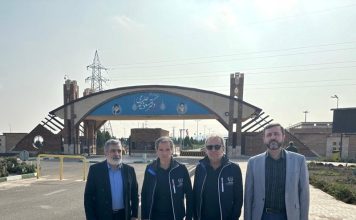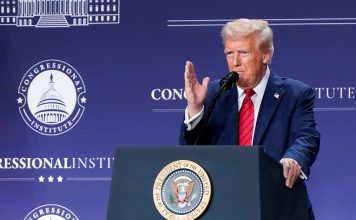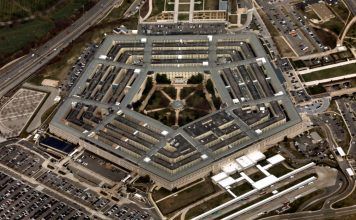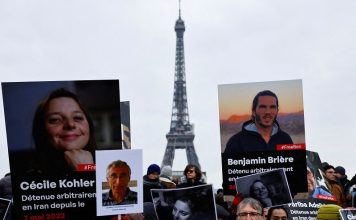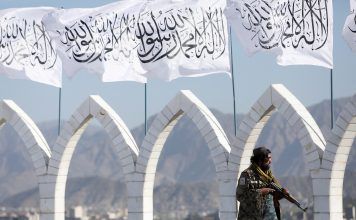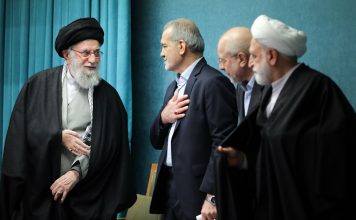By Ahmad Rafat
Vahid Beheshti, a journalist and human rights activist, has been on a hunger strike outside the British Foreign Office in London since Feb. 23 in an effort to urge the British government to add the Islamic Revolutionary Guards Corps (IRGC) to its list of terrorist organizations.
On the 30th day of his hunger strike, Mr. Beheshti, an Iranian-British dual national who emigrated to the UK 24 years ago, sent an open letter to British Prime Minister Rishi Sunak, Foreign Minister James Cleverly, Home Office Secretary Suella Braverman, and Minister of State for Security Tom Tugendhat, saying that he would not end his hunger strike until the UK government had designated the IRGC a terrorist organization.
Kayhan Life recently interviewed Vahid Beheshti outside the Foreign Office in London, where he continues his hunger strike despite the cold weather.
[aesop_image img=”https://kayhanlife.com/wp-content/uploads/2023/03/2023-02-28T104953Z_1312046251_MT1SIPA0007XRXGT_RTRMADP_3_SIPA-USA.jpg” panorama=”off” credit=”(Photo by Vuk Valcic / REUTERS)” align=”center” lightbox=”off” captionsrc=”custom” caption=”Vahid Beheshti sits outside the Foreign, Commonwealth, and Development Office in Westminster. Vahid is demanding that the Islamic Revolutionary Guard Corps (IRGC) in Iran is placed on the list of international terrorist organisations. ” captionposition=”left” revealfx=”off” overlay_revealfx=”off”]
Mr. Beheshti, what is in your open letter to the UK Prime Minister and to the other British ministers?
I have only had one request since the start of my strike: to see the IRGC placed on the list of terrorist groups. We are not asking any country to topple the Islamic Republic. It is the responsibility of Iranians to change the regime.
We must focus on one issue in each phase of the fight. We only want Western countries to stop cooperating with the Islamic Republic. We urge them not to recognize the regime and to designate this inhumane organization [IRGC] as a terrorist group.
In the open letter, I reminded the British government officials that our freedom is threatened in Tehran and here. I urged the UK government to hold a formal meeting with me — not an unofficial talk, the details of which I have been asked to keep confidential — so I can explain the reasons for including the IRGC on the list of terrorist groups.
While the UK government officials have not met you formally, Conservative and Labour members of the British parliament have visited you here. What have they said and promised in their exchanges with you?
Since the 20th day of my hunger strike, a few lawmakers have visited me, including Lord Stuart Polak, who was here a few hours before this interview. He said we were fighting on the same side.
On the 26th day of my strike, which coincided with the first day of the Iranian new year [Nowruz, meaning March 21], Alicia Kearns, chair of the House of Commons Foreign Affairs Select Committee, asked Minister of State for Security Tom Tugendhat, who represented the government in the House that day, ‘when is the government planning to meet with Vahid Beheshti?’
Ms. Alicia Kearns visited me after the parliamentary session that day, and we spoke for an hour and a half. She said she believed in a more radical measure: that of closing the UK Embassy in Tehran altogether.
Ms. Penny Mordaunt, leader of the House of Commons, also mentioned my hunger strike in the Parliament and requested a government response.
The problem is not with the British Parliament or with political parties but with this building [the British Foreign Office] where I am exercising my hunger strike.
You have mentioned the closure of the Iran International TV channel’s offices in your open letter to the prime minister and several ministers of the current British government.
The main point I highlight to British politicians is that their country’s principles are under threat today. As a British citizen, I have gone on a hunger strike to defend these values.
I cannot understand why the British police, with all their power, cannot protect journalists against IRGC threats. The closure of the offices of the TV network is disconcerting because it violates British principles.
Instead of protecting a media outlet’s reporters, the government has asked the news network to cease its activities. What needed to happen was to add the source of the threat to the list of terrorist organizations.
In the past few weeks, several British lawmakers have warned that some institutions affiliated with the Islamic Republic — including a school under the control of the Islamic Republic Embassy in London and other Islamic centers with close links to Supreme Leader Ali Khamenei’s office which receive financial help from Britain — are involved in activities that contradict this country’s values. What do you think about these activities?
I have often said that young people are brainwashed in these institutions in Britain. The Islamic Republic and British taxpayers’ money fund these centers where young people are brainwashed. They are used to establishing terrorist sleeper cells, which Tehran can activate at short notice.



